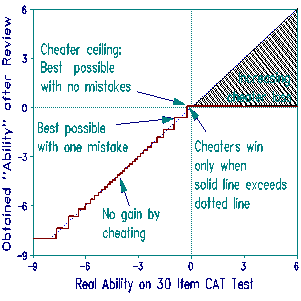
When first introduced, MCQ tests were thought immune to test- taking strategy. We were soon disillusioned. Now computer- adaptive (CAT) tests are thought to be immune, but this time test constructors are alert. A tempting strategy is to deliberately fail the first CAT items, in order to solicit easier items from then on. This will produce an artificially high success rate and, perhaps, a higher measure than would have otherwise been obtained.
Gershon and Bergstrom (1995) considered this strategy under the best possible conditions for the potential cheater: a CAT test which allows an examinee to review and change any responses. This type of examinee-friendly CAT is already used in high-stakes tests and will rapidly spread, once CAT fairness becomes a priority.
Consider an extreme case in which an examinee deliberately fails all 30 items of a 30 item CAT test. After these 30 items, the algorithm would assign that examinee a minimum measure. But then, at the last moment, the examinee reviews all 30 items, most of which are very easy, and corrects all the responses. What happens?

The Plot of obtained versus real ability shows the answer. When real ability is high, all items will end up correct. But they are easy items, so the obtained ability will not be so high. Cheaters with high real abilities will invariably lose. It turns out that, at best, lower ability cheaters can obtain no more than an extra .2 logits beyond their real ability. Usually even these cheaters lose because, if they make just one slip, their obtained ability will be lower than their real ability. And now there may no longer be the opportunity to take more items to recover from that mistake, as there would be during normal CAT test administration. Should cheaters accidently exit without making corrections, they could lose 8 or more logits.
Under the most favorable circumstances this strategy can only help the examinee minutely, and even that at the risk of disaster.
A word to wise examinees:
Do not attempt this method of cheating!
CAT and test-wiseness. Gershon R. & Bergstrom B. … Rasch Measurement Transactions, 1995, 9:1 p.405-6
| Forum | Rasch Measurement Forum to discuss any Rasch-related topic |
Go to Top of Page
Go to index of all Rasch Measurement Transactions
AERA members: Join the Rasch Measurement SIG and receive the printed version of RMT
Some back issues of RMT are available as bound volumes
Subscribe to Journal of Applied Measurement
Go to Institute for Objective Measurement Home Page. The Rasch Measurement SIG (AERA) thanks the Institute for Objective Measurement for inviting the publication of Rasch Measurement Transactions on the Institute's website, www.rasch.org.
| Coming Rasch-related Events | |
|---|---|
| Jan. 16 - Feb. 13, 2025, Fri.-Fri. | On-line workshop: Rasch Measurement - Core Topics (E. Smith, Winsteps), www.statistics.com |
| Apr. 8 - Apr. 11, 2026, Wed.-Sat. | National Council for Measurement in Education - Los Angeles, CA, ncme.org/events/2026-annual-meeting |
| Apr. 8 - Apr. 12, 2026, Wed.-Sun. | American Educational Research Association - Los Angeles, CA, www.aera.net/AERA2026 |
| May. 15 - June 12, 2026, Fri.-Fri. | On-line workshop: Rasch Measurement - Core Topics (E. Smith, Winsteps), www.statistics.com |
| June 19 - July 25, 2026, Fri.-Sat. | On-line workshop: Rasch Measurement - Further Topics (E. Smith, Winsteps), www.statistics.com |
The URL of this page is www.rasch.org/rmt/rmt91f.htm
Website: www.rasch.org/rmt/contents.htm